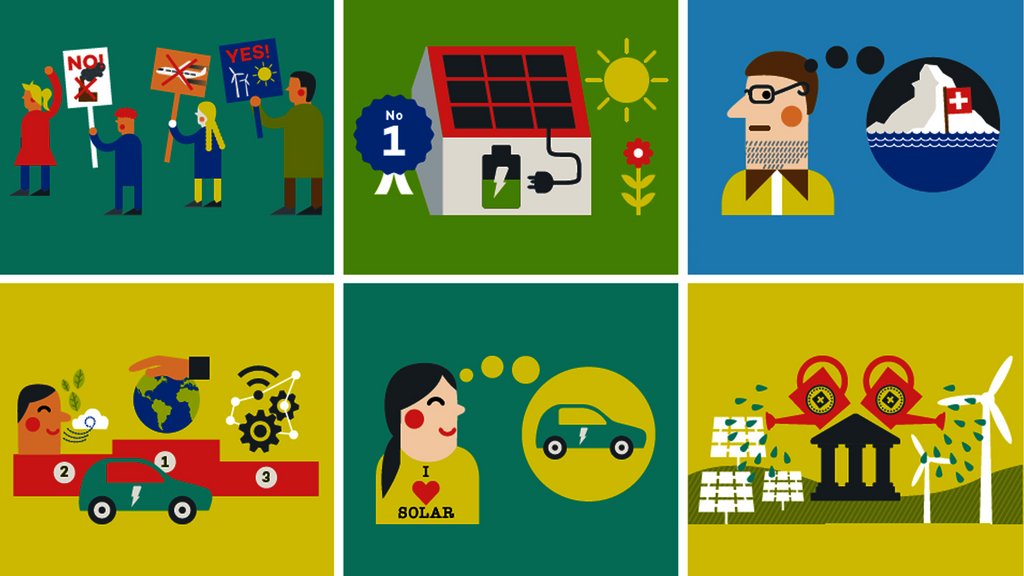Research - 24.05.2019 - 00:00
9th Customer Barometer for Renewable Energies
Everyone is talking about climate strikers. How does the population rate young people’s protest? In what areas will an increased climate awareness also lead to house owners changing their investment decisions? And what role do emotions play in all this? Answers to this question constitute the core of the Customer Barometer for Renewable Energies, which is published for the ninth time today and is the result of cooperation between University of St. Gallen, Raiffeisen and EnergieSchweiz.

24 May 2019. The results reveal that a majority of the population view the climate protests favourably. 55% of the interviewees are of the opinion that the climate strikes of the school student movement #FridaysForFuture are justified or justified to a certain extent. 61% think that the Swiss climate policy should take more ambitious measures in response to the strikes.
Majority for domestic climate protection targets
95% of the interviewees consider that Switzerland should at least partially attain its climate targets domestically, and 62% think that the proportion of domestic emission reductions should amount to 50% or more. A considerable quota of the interviewees (47%) would like further information about the consequences of a reduction in CO2 emissions at home as opposed to abroad.
Mixed feelings about the implementation of the energy strategy
One possibility of reducing emissions domestically is the extension of renewable energies as adopted in the context of the Energy Strategy 2050. A distinct majority support the extension of solar (85%) and wind (57%) at the national level. Differences manifest themselves at the crossover from general acceptance to the emotions which the two energy sources evoke at the local level. More people (42% and 9%, respectively) would be worried if wind and solar energy were installed in their neighbourhood, and fewer people (28% and 66%, respectively) would be proud of it. Whereas 70% of the interviewees are curious about wind energy, a small minority of 11% are enraged by it. These results demonstrate that above and beyond the production of objective information, dealing with emotional concerns is an important element of societal acceptance.
Energy efficiency in building a great concern
37% of house or flat owners indicated that they were planning to improve the energy efficiency of their properties within the next three years. A majority of interviewees (58%) would support a compulsory certification of the energy efficiency of buildings (GEAK). The interviewees regard the information about energy consumption (32%) and the operating costs of buildings (31%) as the main advantages of energy certification. Only 8% are aware of the fact that a compulsory certification has boosted the value of energy-efficient buildings in other countries. 59% of the interviewees would also welcome it if Swiss banks were more strongly committed to the funding of climate-friendly projects.
Positive emotions about solar energy are a strong indicator of people’s interest in other energy-related investments. People who are curious about solar energy, for example, are twice as likely to buy an electric car in the next two years. For the first time in ten years, solar systems with battery storage have overtaken heat pumps as the most popular investment option for home owners.
Approval of an air ticket tax
63% of the interviewees agreed or tended to agree with the statement that flying was too cheap; this is 6 percentage points more than in 2018. The results indicate that an air ticket tax of approx. CHF 20 on short-haul flights might find approval with a large part of the population. 24% of the interviewees are against a CO2 tax on air tickets as a matter of principle. The detailed results of the study can be found in the internet in German, English and French at www.iwoe.unisg.ch/kundenbarometer.
About the Customer Barometer for Renewable Energies
Since 2011, the Customer Barometer for Renewable Energies has established itself as one of the most extensive surveys of the Swiss population’s preferences with regard to energy issues. The academic lead of the study is in the hands of the Chair for the Management of Renewable Energies of the University of St.Gallen (HSG). Raiffeisen Switzerland is funding the conduct of the survey and supports the development of the questionnaire. The EnergieSchweiz programme, which was launched by the Federal Council in 2001, continues to support the survey. The sample (N=1021) is representative of the population in terms of gender, region, educational background and political party preferences.
More articles from the same category
Discover our special topics











